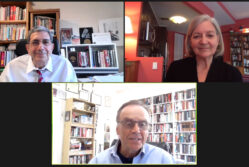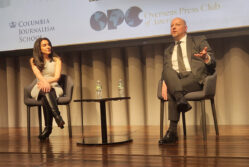
China Correspondents Push Back Against Crackdown
Life as a foreign correspondent in China is getting harder. Over the last year, the government has tightened reins on journalists, and reports of intimidation, visa denials and even attacks are on the rise. The government has cracked down on press freedom and accused reporters of widespread “false reports,” bribes and extortion. In June this year, the country introduced new media restrictions.
The Foreign Correspondents’ Club of China outlined these troubling trends in a scathing 14-page report during the China Hands Reunion earlier this month.
“Authorities have increasingly used visa denials and delays, or the threat of visa denials and delays, to express displeasure with foreign outlets’ news coverage,” the report reads.
Kathleen McLaughlin, a Knight Science Journalism fellow at MIT and Asia contributor to The Economist and Guardian who was once the head of the FCCC’s press freedom committee, said two-thirds of club members who answered a survey said they experienced interference, harassment or violence while attempting to report in China the previous year. Ten percent said they were subjected to manhandling or physical force. About half of those with news assistants said that Chinese staff members were harassed or intimidated at least once over the last year, up from 35 percent the year before.
“There’s been a growing trend of preemptive interference in coverage,” McLaughlin said. “And that would be the authorities calling people up and saying ‘don’t go to Tiananmen on June 4th.’ That’s become pretty commonplace and troubling. Tiananmen is not officially off limits to anyone, and that includes foreign correspondents.”
Chinese embassy staff in the U.S. and Europe have even showed up at media headquarters to complain about coverage that they didn’t like. Sources in China were threatened with violence for talking to the foreign press, according to cases cited in the survey.
In the position paper, the FCCC called for an end to intimidation of journalists, staff and sources.
The club also called on the government to lift its ban on reporting in Tibet, allow more access to news sites and government information, and end cyber attacks against journalists, among dozens of other recommendations.
The Chinese government blocked The New York Times website and began restricting access to visas after an investigative story in October 2012 that revealed the wealth of prime minister Wen Jiabao’s family.
Joseph Kahn, foreign editor of The Times, said the Chinese government told the newspaper that it would have to put in writing that it would agree not to publish stories that the government thought were offensive. The newspaper declined, Kahn said.
“The moment that we even wink and nod that we’re going to avoid a certain pattern of coverage or type of reporting in a place like China, I’m not sure what value our brand has. So that’s not an option for us, and we’ve told them that.”
Kahn said a silver lining to the paper’s standoff with China is that the government has been cracking down on corruption and investigating wealth within the military and political elite.
“The foreign ministry doesn’t thank Bloomberg or The New York Times for helping to put that on the agenda, but the truth is that the issue is not as verboten as it seemed to be previously.”
Minky Worden, director of global initiatives for Human Rights Watch, said press freedom in Hong Kong had devolved into the worst conditions since the handover in 1997, with increasing reports of violence and intimidation.
In February this year, two men attacked Kevin Lau, the former chief editor of daily newspaper Ming Pao, with knives as he was getting out of his car, stabbing him in the back and legs. “Literally so that he could not continue standing and reporting,” she said.
Hong Kong’s Central Liaison Office has dictated coverage and bullied advertisers into pulling support from critical media, she said.
“The Chinese government is using the full range of tools at its disposal, but journalists in Hong Kong and those who support press freedom also have a full range of tools at our disposal,” she said.
She called on foreign press clubs to denounce financial attacks on media, and for journalists and watchdogs to use available financial information in Hong Kong as leverage.
“There are threats to journalists, there are threats to news organizations, there are threats to owners. But I do think that the international community and press freedom organizations have an essential role to play.”



